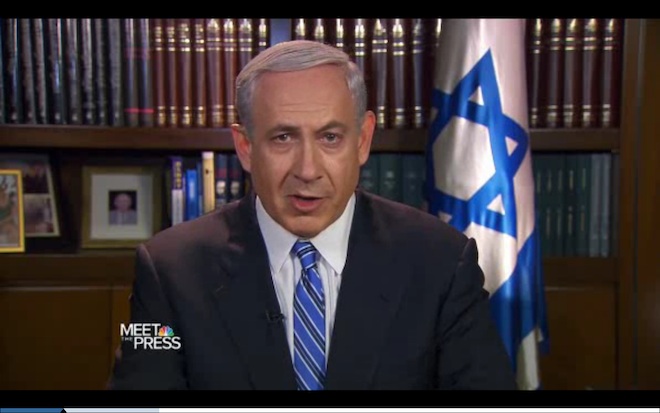Israeli Prime Minister Benjamin Netanyahu denied accusations from critics that he is trying to influence the U.S. presidential election, despite escalating his demands that the United States draw a “red line” to thwart Iran’s nuclear program just weeks before Election Day. Instead, Netanyahu argued that he is the one being dragged into election-year politics.
In appearances on two Sunday talk shows, Netanyahu refused to comment on Mitt Romney’s accusation that President Obama has thrown Israel “under the bus,” and denied that his own urgency with regard to Iran has anything to do with the upcoming election.
“What’s guiding my statements is not the American political calendar, but the Iranian nuclear calendar,” Netanyahu said on NBC’s “Meet the Press,” telling host David Gregory repeatedly that he refuses to be “drawn into the American election.”
Netanyahu has recently stepped up his call for the United States and other countries to draw a “red line” with regards to Iran’s nuclear program that would invite military action if crossed, a move he called “vital” Sunday on CNN.
Critics have suggested that Netanyahu is pushing the Obama administration to give Iran an ultimatum now out of fear that his leverage will disappear after Election Day. Others have suggested Netanyahu, whose relationship with Romney goes back to the Boston Consulting Group in 1970s, is trying to tip the scales for the Republican nominee. Netanyahu vigorously disputed such charges Sunday. He said he believes Obama and Romney are both committed to preventing Iran from acquiring a nuclear weapon and that support for Israel in the U.S. is bipartisan.
“I have no doubt that they’re equally committed to preventing that,” he said.
Despite Netanyahu’s assertions, Romney has made the complicated relationship between the United States and Israel a major issue in his campaign. Netanyahu distanced himself from the Republican nominee’s charges that Obama is not sufficiently pro-Israel.
“No, there you go again, David, you’re trying to draw me into something that is simply not the case, and it’s not my position,” Netanyahu said. “So there’s no bus. And we’re not going to get into that discussion, except to say one thing. We have a strong alliance, and we’re going to continue to have a strong alliance. I think the important question is where does the — the only bus that is really important is the Iranian nuclear bus. That’s the one that we have to derail. And that’s my interest, and that’s my only interest.”
Netanyahu also declined to attack Obama for not arranging to meet with him in upcoming United Nations meetings in New York, reports which Romney seized on earlier this week to criticize Obama. “I think he’s met me more than any other leader in the world and I appreciate that,” Netanyahu said. “We’ve had our discussions. Our schedules on this visit didn’t work out. I come to New York, he leaves New York. But we continue in close consultation.”
Romney called reports that Obama rejected a request to meet with Netanyahu “confusing and troubling” at a New York fundraiser earlier this week. The White House has denied these reports and noted that Obama and Netanyahu spoke for an hour on the phone last Tuesday night.
The Israeli prime minister made the same point in an appearance on CNN’s “State of the Union,” saying he is not trying to get involved in the U.S. election but rather was being “drawn into the American election.”
The position of the United States is that while it is unacceptable for Iran to build a nuclear weapon, the situation is less urgent than Israel posits, and that economic sanctions against Iran are beginning to have an effect.
“Our shared intelligence assessments is that there is still a considerable time and space before they will have a nuclear weapon should they make the decision to go for that,” Susan Rice, the U.S. Ambassador to the United Nations, said on “State of the Union” Sunday, appearing after Netanyahu.
Rice said the Iranian economy was “beginning to buckle” under a new round of tough sanctions. “So we think that there’s still considerable time for this pressure to work,” she said. “But this is not an infinite window. And we’ve made very clear that the president’s bottom line is Iran will not have a nuclear weapon.”






